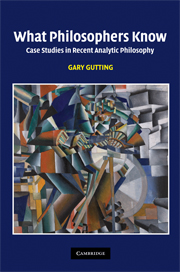Book contents
- Frontmatter
- Contents
- Acknowledgments
- Introduction
- PART I HOW DOES THAT GO? THE LIMITS OF PHILOSOPHICAL ARGUMENT
- PART II ARGUMENTS AND CONVICTIONS
- 5 Turning the tables: Plantinga and the rise of philosophy of religion
- 6 Materialism and compatibilism: two dogmas of analytic philosophy?
- 7 Was there a Kuhnian revolution? Convictions in the philosophy of science
- 8 Conviction and argument in Rawls' A Theory of Justice
- PART III PHILOSOPHICAL TRUTH AND KNOWLEDGE
- References
- Index
8 - Conviction and argument in Rawls' A Theory of Justice
Published online by Cambridge University Press: 05 June 2012
- Frontmatter
- Contents
- Acknowledgments
- Introduction
- PART I HOW DOES THAT GO? THE LIMITS OF PHILOSOPHICAL ARGUMENT
- PART II ARGUMENTS AND CONVICTIONS
- 5 Turning the tables: Plantinga and the rise of philosophy of religion
- 6 Materialism and compatibilism: two dogmas of analytic philosophy?
- 7 Was there a Kuhnian revolution? Convictions in the philosophy of science
- 8 Conviction and argument in Rawls' A Theory of Justice
- PART III PHILOSOPHICAL TRUTH AND KNOWLEDGE
- References
- Index
Summary
There is no doubt that John Rawls' A Theory of Justice effected a major transformation in philosophical thinking about political and ethical topics. It is often noted that he revived the enterprises of political philosophy and normative ethics, both of which had languished under the earlier analytic regimen of meta-analysis. He also reversed the polarity of discussions in normative ethics. When his book appeared, utilitarianism was the dominant view among analytic ethicists, but, as Samuel Scheffler notes, “utilitarianism's predominant status has been open to serious question ever since A Theory of Justice set forth his powerful alternative vision.”
Our concern in this chapter is with the philosophical means whereby Rawls achieved his transformation of ethical and political thought. How did he make his case for his theory of justice and what can we learn about the nature of philosophical inquiry from Rawls' achievement? Unlike our previous case studies, this one deals with a lengthy book and our relatively brief foray will hardly put us in a position to judge what specific philosophical knowledge he has or has not achieved. We will, however, find a deeper understanding of how convictions can function in philosophical argument.
THE ORIGINAL POSITION AND ITS CONSTRAINTS
The ultimate goal of A Theory of Justice is to establish the truth of two principles, together expressing a conception of justice that Rawls argues should regulate the basic political, social, and economic structures of society.
- Type
- Chapter
- Information
- What Philosophers KnowCase Studies in Recent Analytic Philosophy, pp. 173 - 194Publisher: Cambridge University PressPrint publication year: 2009



